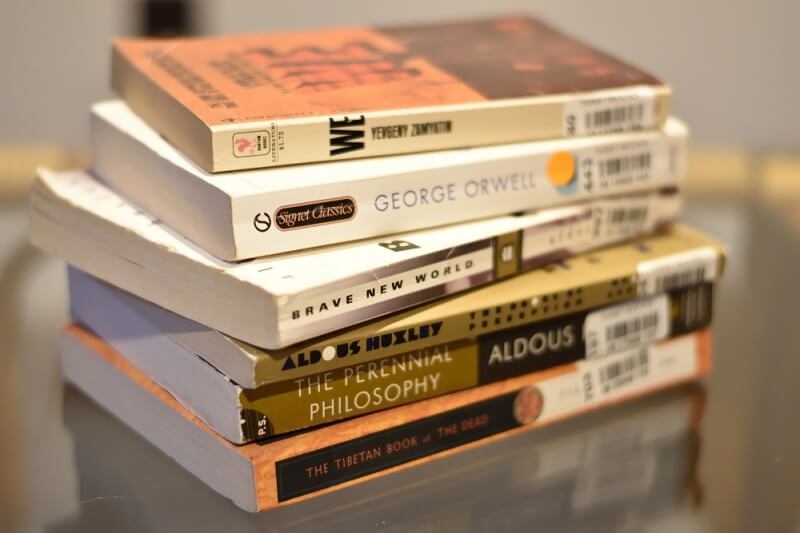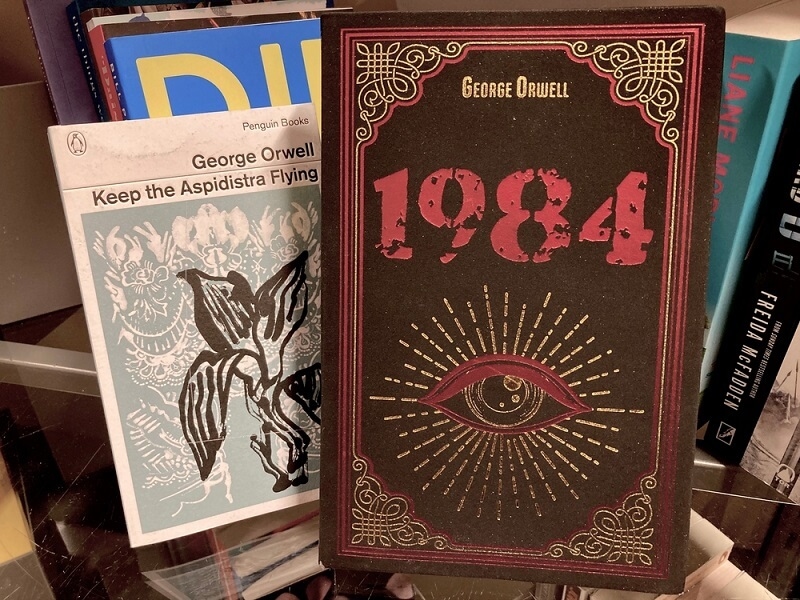
There’s something about dystopias that pulls people in. Maybe it’s curiosity. Maybe it’s the thrill of peeking into a “what if” future that feels uncomfortably close. Or maybe we like testing ourselves—wondering, “Would I survive this world?” Whatever the reason, dystopian novels keep us hooked. They’re not just stories; they’re warnings, thought experiments, and sometimes… mirrors.
Let’s be honest—the real world is stressful enough. So why pile on with these bleak futures? Because they’re not just about endings. They’re about choices. They ask, “What kind of society are we building? What happens if we don’t pay attention?” That’s why dystopian novels matter. They scare us, but they also sharpen us.
So, if you’ve been craving books that shake you a little, make you glance at the news differently, here’s a top ten list that will do exactly that.

Bleak doesn’t even begin to cover it. Orwell created Big Brother, and once you read this book, you’ll see shadows of him everywhere—in your phone, in headlines, even in how people twist words online. It’s suffocating, yes, but that’s the point. It set the stage for dark dystopian fiction, and it still rattles readers today.
It’s not just a book; it’s a symbol now. Red cloaks, white bonnets—you’ve seen them in protests, on TV. Atwood’s story of women stripped of autonomy is horrifying because it doesn’t feel impossible. Every page makes you ask, “How far away is this, really?” No wonder it sits among the most powerful modern dystopian reads.
Where Orwell gave us fear, Huxley gave us distraction. Pleasure, drugs, entertainment—all numbing tools of control. Reading it today feels eerie when you think about endless scrolling, instant gratification, the constant hum of distraction. Happiness or emptiness? Huxley asks you to decide.
This one’s a juggernaut. A world where survival is televised, kids fight for their lives, and the rich Capitol feasts while others starve. Yes, it’s thrilling, but it’s also sharp social commentary on inequality and spectacle. Katniss became a cultural icon, and this series cemented itself as the face of dystopian novels like Hunger Games.
Books set on fire. Ideas erased. People numbed by shallow distractions. Bradbury wrote this decades ago, but it feels like he peeked at our world before he wrote it. The firemen don’t save lives—they burn knowledge. And the scariest part? How easy it is to imagine this happening.
Teenagers divided into factions, forced to live in boxes they don’t quite fit. Sound familiar? That’s why it connected so well with younger readers. It’s not just adventure—it’s identity, rebellion, figuring out where you belong. If someone asked for dystopia book recommendations for young adults, this one’s usually at the top of the pile.
This one hurts. A father and son, walking through a dead world. No color, no comfort, just survival. The prose is stripped bare, the hope almost gone. It’s heavy, but unforgettable. When people talk about dark dystopian fiction, this is the book that often comes up. It doesn’t thrill—it devastates.
A traveling troupe of actors keeping Shakespeare alive after a pandemic wipes out most of humanity. Sounds odd, right? But it works. It’s haunting and hopeful at the same time, reminding us why art matters even when survival is the focus. Out of all the modern dystopian reads, this one feels quietly brilliant.
At first, it seems calm. A boarding school, students with secrets. Then the truth sinks in: they’re clones, raised for organ donation. The horror isn’t loud—it’s quiet, lingering. Ishiguro makes you feel the weight of resignation. It doesn’t scream dystopia, but it whispers it in a way that chills. Honestly, this deserves a spot whenever people list underrated dystopian novels.
Butler was ahead of her time. Climate change, social collapse, violence—it’s all here. But so is resilience. A young woman with a vision, trying to build something new in the ruins. It’s gritty, it’s brutal, but it’s also hopeful in its own way. For years it was overlooked, but now it’s climbing back onto lists of underrated dystopian novels—and rightfully so.
Not every reader wants to jump into Orwell right away. That’s okay. Start lighter if you need to. The Hunger Games or Divergent are perfect dystopia book recommendations for young adults. They’ll hook you without crushing you. If you’re ready for heavier? Go for 1984 or The Road. And if you like something with a sliver of hope, Station Eleven might be your sweet spot.
As odd as it sounds, dystopias can be comforting. Not because they’re happy—far from it—but because they remind us that survival is possible even in the bleakest circumstances. When you see characters navigating ruined worlds or oppressive governments, it makes your own daily struggles feel… manageable.
Deadlines, bills, traffic—they don’t seem as crushing when you’ve just read about someone fighting to find food in a wasteland. That strange sense of perspective is part of why people keep reaching for these books, even when the world already feels heavy.
Every decade seems to have its “big” dystopia. In the mid-20th century, Orwell and Huxley dominated. In the early 2000s, it was Katniss and the Capitol. Now we’re seeing a wave of modern dystopian reads that deal with pandemics, climate collapse, and digital control. Why? Because the anxieties shift, but the questions stay the same.
Who has the power? What happens when people lose their voices? These books keep coming back because they evolve alongside us, reflecting the fears of whatever era we’re living in. And honestly, that’s what keeps them so alive.
The best dystopias aren’t just about ruined worlds—they’re about the people trying to survive inside them. Some fight back. Some break down. Some cling to hope no matter what. That’s why we keep turning the pages. Because somewhere in those ruined cities, or empty landscapes, or oppressive regimes, we see ourselves.
So if you’re ready to look into the dark and still find a flicker of light, pick one of these books up. Don’t be surprised if it changes the way you look at today.
This content was created by AI